RCT Proposal: Evaluating a Mindfulness-Oriented Stress Program
VerifiedAdded on 2023/06/11
|7
|1937
|315
Project
AI Summary
This project presents a detailed proposal for a Randomized Controlled Trial (RCT) designed to assess the effectiveness of a mindfulness-oriented stress management program in reducing stress levels among medical students. The proposal includes a background section highlighting the prevalence of psychological distress in medical students and the need for effective stress management interventions. It outlines key hypotheses related to the impact of stress prevention training on stress levels and psychological well-being. The methodology section describes the RCT design, including participant recruitment from medical and dental students, randomization procedures to allocate participants to control, standard treatment (Autogenic training), and experimental treatment (MediMind) groups, and the use of various outcome tools such as the Trier Inventory for the Assessment of Chronic Stress, brief COPE, Brief Symptom Inventory (BSI), Response Style Questionnaire (RSQ), and Freiburg Mindfulness Inventory (FMI). The discussion addresses potential limitations, such as motivational bias and student workload, while emphasizing the study's potential to alleviate stress and improve psychological health among medical students. Desklib provides a platform to access similar solved assignments and research resources.
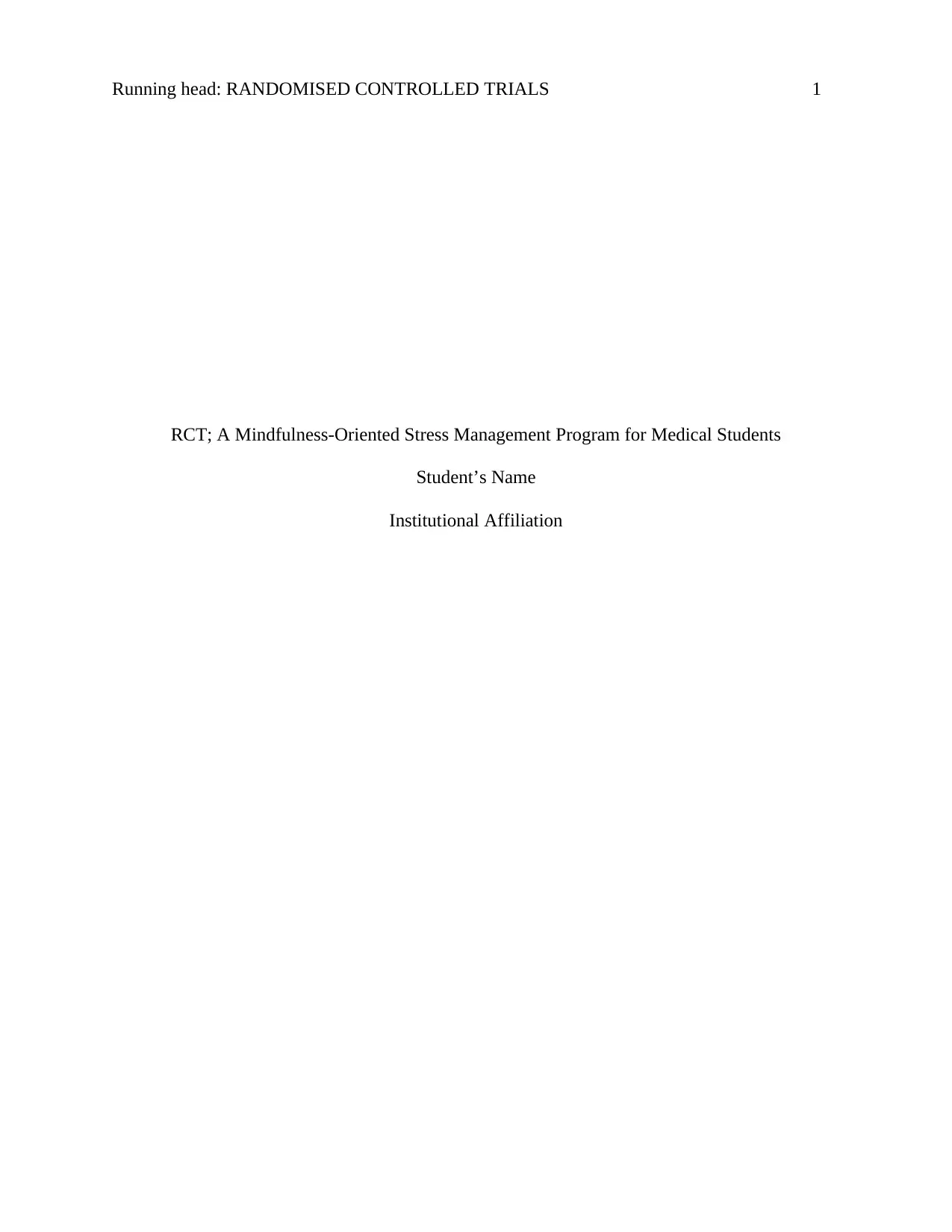
Running head: RANDOMISED CONTROLLED TRIALS 1
RCT; A Mindfulness-Oriented Stress Management Program for Medical Students
Student’s Name
Institutional Affiliation
RCT; A Mindfulness-Oriented Stress Management Program for Medical Students
Student’s Name
Institutional Affiliation
Paraphrase This Document
Need a fresh take? Get an instant paraphrase of this document with our AI Paraphraser
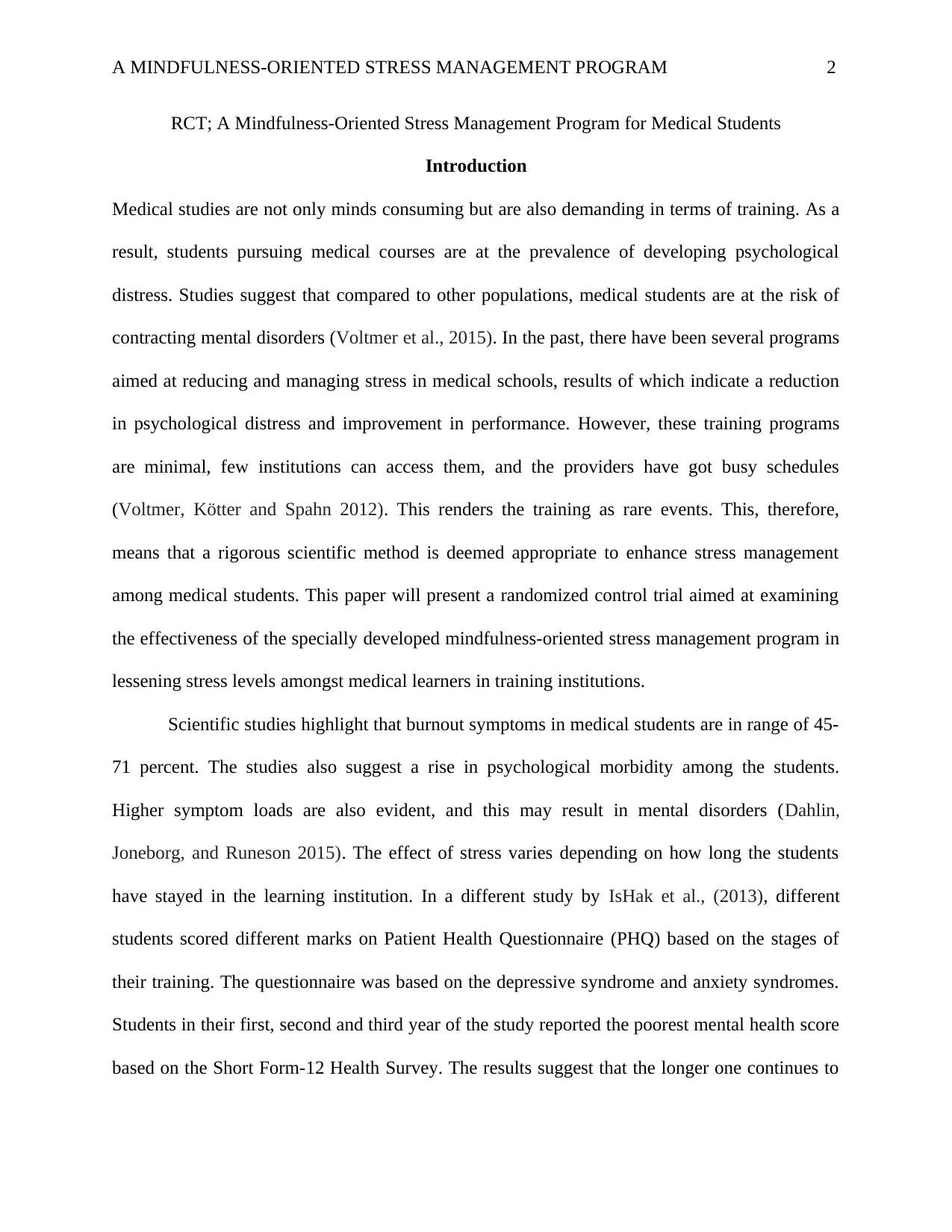
A MINDFULNESS-ORIENTED STRESS MANAGEMENT PROGRAM 2
RCT; A Mindfulness-Oriented Stress Management Program for Medical Students
Introduction
Medical studies are not only minds consuming but are also demanding in terms of training. As a
result, students pursuing medical courses are at the prevalence of developing psychological
distress. Studies suggest that compared to other populations, medical students are at the risk of
contracting mental disorders (Voltmer et al., 2015). In the past, there have been several programs
aimed at reducing and managing stress in medical schools, results of which indicate a reduction
in psychological distress and improvement in performance. However, these training programs
are minimal, few institutions can access them, and the providers have got busy schedules
(Voltmer, Kötter and Spahn 2012). This renders the training as rare events. This, therefore,
means that a rigorous scientific method is deemed appropriate to enhance stress management
among medical students. This paper will present a randomized control trial aimed at examining
the effectiveness of the specially developed mindfulness-oriented stress management program in
lessening stress levels amongst medical learners in training institutions.
Scientific studies highlight that burnout symptoms in medical students are in range of 45-
71 percent. The studies also suggest a rise in psychological morbidity among the students.
Higher symptom loads are also evident, and this may result in mental disorders (Dahlin,
Joneborg, and Runeson 2015). The effect of stress varies depending on how long the students
have stayed in the learning institution. In a different study by IsHak et al., (2013), different
students scored different marks on Patient Health Questionnaire (PHQ) based on the stages of
their training. The questionnaire was based on the depressive syndrome and anxiety syndromes.
Students in their first, second and third year of the study reported the poorest mental health score
based on the Short Form-12 Health Survey. The results suggest that the longer one continues to
RCT; A Mindfulness-Oriented Stress Management Program for Medical Students
Introduction
Medical studies are not only minds consuming but are also demanding in terms of training. As a
result, students pursuing medical courses are at the prevalence of developing psychological
distress. Studies suggest that compared to other populations, medical students are at the risk of
contracting mental disorders (Voltmer et al., 2015). In the past, there have been several programs
aimed at reducing and managing stress in medical schools, results of which indicate a reduction
in psychological distress and improvement in performance. However, these training programs
are minimal, few institutions can access them, and the providers have got busy schedules
(Voltmer, Kötter and Spahn 2012). This renders the training as rare events. This, therefore,
means that a rigorous scientific method is deemed appropriate to enhance stress management
among medical students. This paper will present a randomized control trial aimed at examining
the effectiveness of the specially developed mindfulness-oriented stress management program in
lessening stress levels amongst medical learners in training institutions.
Scientific studies highlight that burnout symptoms in medical students are in range of 45-
71 percent. The studies also suggest a rise in psychological morbidity among the students.
Higher symptom loads are also evident, and this may result in mental disorders (Dahlin,
Joneborg, and Runeson 2015). The effect of stress varies depending on how long the students
have stayed in the learning institution. In a different study by IsHak et al., (2013), different
students scored different marks on Patient Health Questionnaire (PHQ) based on the stages of
their training. The questionnaire was based on the depressive syndrome and anxiety syndromes.
Students in their first, second and third year of the study reported the poorest mental health score
based on the Short Form-12 Health Survey. The results suggest that the longer one continues to
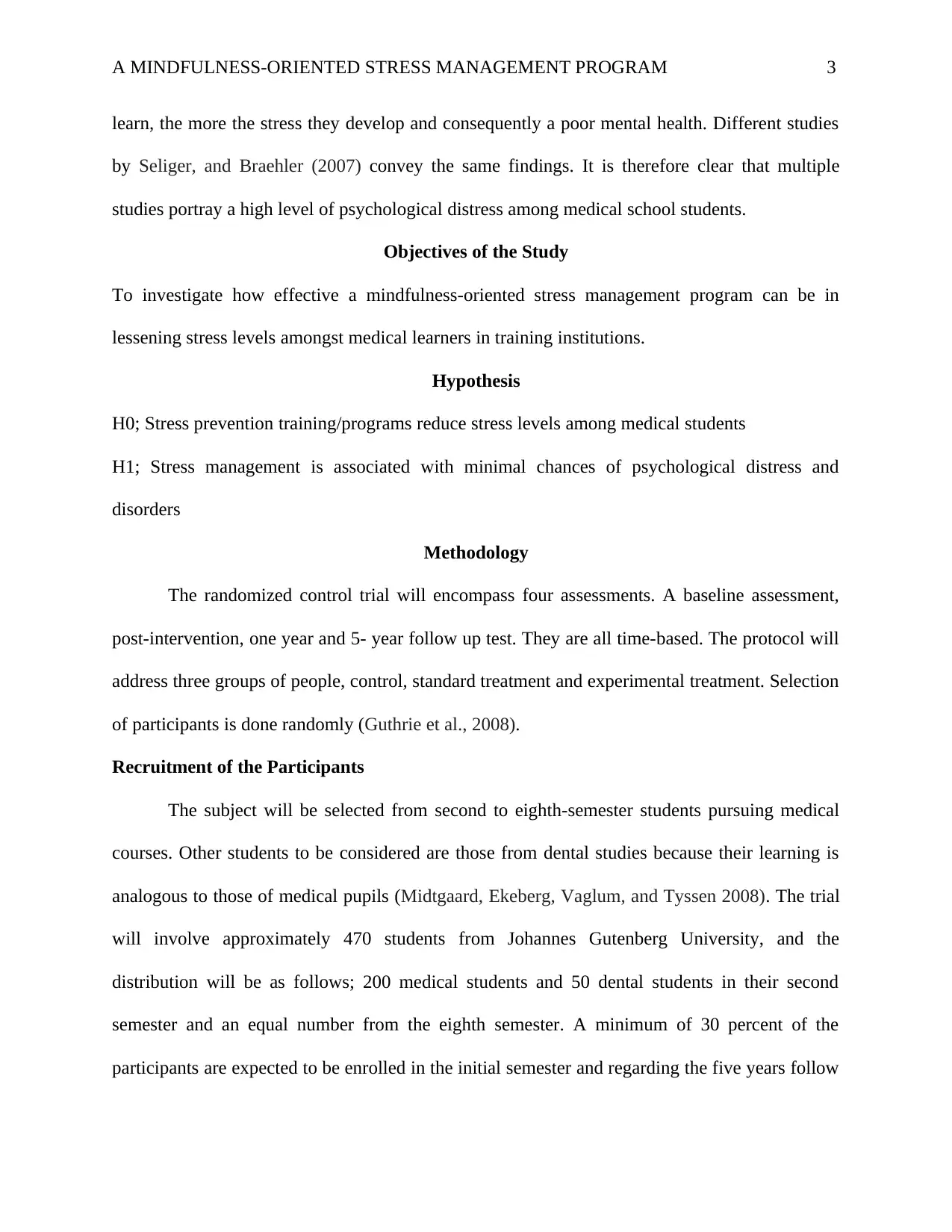
A MINDFULNESS-ORIENTED STRESS MANAGEMENT PROGRAM 3
learn, the more the stress they develop and consequently a poor mental health. Different studies
by Seliger, and Braehler (2007) convey the same findings. It is therefore clear that multiple
studies portray a high level of psychological distress among medical school students.
Objectives of the Study
To investigate how effective a mindfulness-oriented stress management program can be in
lessening stress levels amongst medical learners in training institutions.
Hypothesis
H0; Stress prevention training/programs reduce stress levels among medical students
H1; Stress management is associated with minimal chances of psychological distress and
disorders
Methodology
The randomized control trial will encompass four assessments. A baseline assessment,
post-intervention, one year and 5- year follow up test. They are all time-based. The protocol will
address three groups of people, control, standard treatment and experimental treatment. Selection
of participants is done randomly (Guthrie et al., 2008).
Recruitment of the Participants
The subject will be selected from second to eighth-semester students pursuing medical
courses. Other students to be considered are those from dental studies because their learning is
analogous to those of medical pupils (Midtgaard, Ekeberg, Vaglum, and Tyssen 2008). The trial
will involve approximately 470 students from Johannes Gutenberg University, and the
distribution will be as follows; 200 medical students and 50 dental students in their second
semester and an equal number from the eighth semester. A minimum of 30 percent of the
participants are expected to be enrolled in the initial semester and regarding the five years follow
learn, the more the stress they develop and consequently a poor mental health. Different studies
by Seliger, and Braehler (2007) convey the same findings. It is therefore clear that multiple
studies portray a high level of psychological distress among medical school students.
Objectives of the Study
To investigate how effective a mindfulness-oriented stress management program can be in
lessening stress levels amongst medical learners in training institutions.
Hypothesis
H0; Stress prevention training/programs reduce stress levels among medical students
H1; Stress management is associated with minimal chances of psychological distress and
disorders
Methodology
The randomized control trial will encompass four assessments. A baseline assessment,
post-intervention, one year and 5- year follow up test. They are all time-based. The protocol will
address three groups of people, control, standard treatment and experimental treatment. Selection
of participants is done randomly (Guthrie et al., 2008).
Recruitment of the Participants
The subject will be selected from second to eighth-semester students pursuing medical
courses. Other students to be considered are those from dental studies because their learning is
analogous to those of medical pupils (Midtgaard, Ekeberg, Vaglum, and Tyssen 2008). The trial
will involve approximately 470 students from Johannes Gutenberg University, and the
distribution will be as follows; 200 medical students and 50 dental students in their second
semester and an equal number from the eighth semester. A minimum of 30 percent of the
participants are expected to be enrolled in the initial semester and regarding the five years follow
⊘ This is a preview!⊘
Do you want full access?
Subscribe today to unlock all pages.

Trusted by 1+ million students worldwide
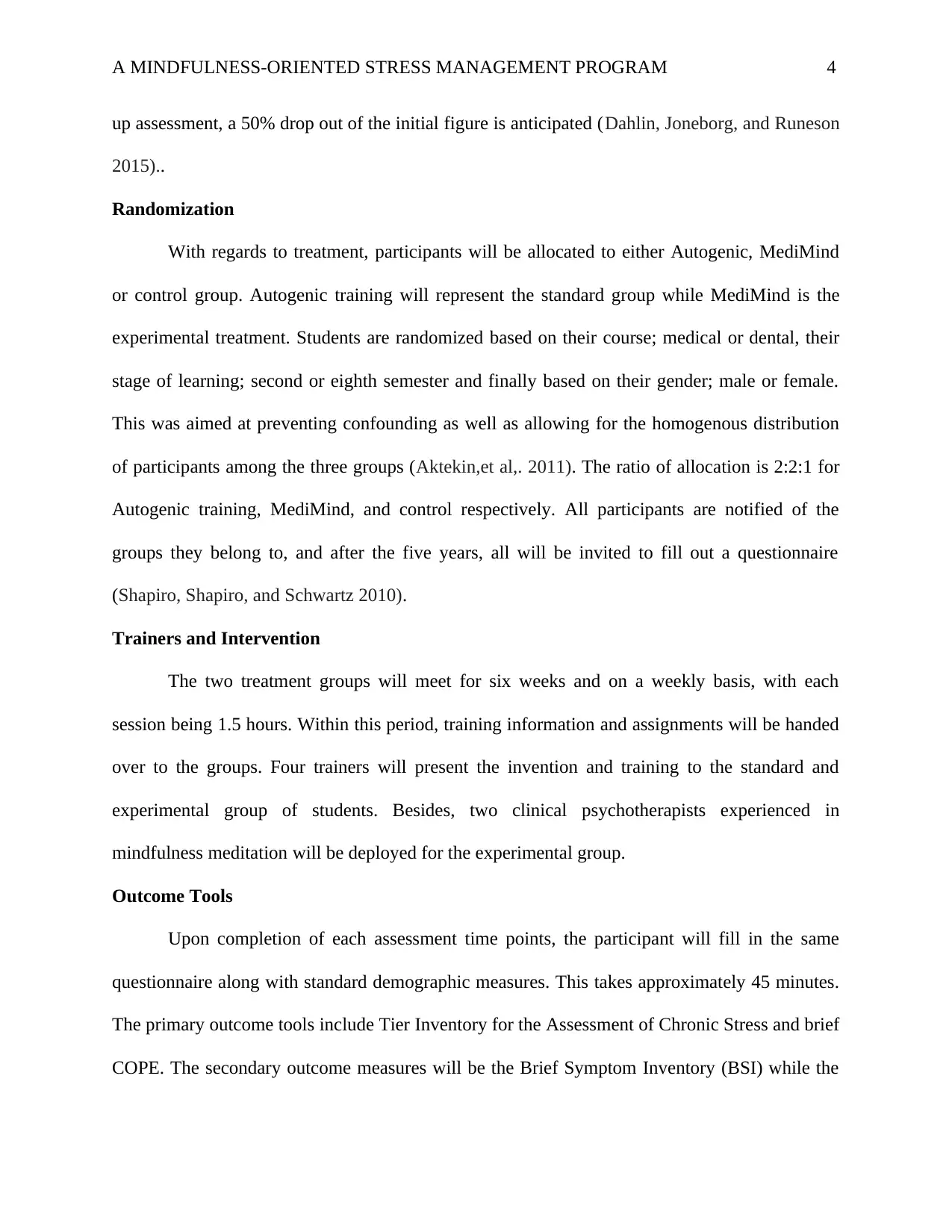
A MINDFULNESS-ORIENTED STRESS MANAGEMENT PROGRAM 4
up assessment, a 50% drop out of the initial figure is anticipated (Dahlin, Joneborg, and Runeson
2015)..
Randomization
With regards to treatment, participants will be allocated to either Autogenic, MediMind
or control group. Autogenic training will represent the standard group while MediMind is the
experimental treatment. Students are randomized based on their course; medical or dental, their
stage of learning; second or eighth semester and finally based on their gender; male or female.
This was aimed at preventing confounding as well as allowing for the homogenous distribution
of participants among the three groups (Aktekin,et al,. 2011). The ratio of allocation is 2:2:1 for
Autogenic training, MediMind, and control respectively. All participants are notified of the
groups they belong to, and after the five years, all will be invited to fill out a questionnaire
(Shapiro, Shapiro, and Schwartz 2010).
Trainers and Intervention
The two treatment groups will meet for six weeks and on a weekly basis, with each
session being 1.5 hours. Within this period, training information and assignments will be handed
over to the groups. Four trainers will present the invention and training to the standard and
experimental group of students. Besides, two clinical psychotherapists experienced in
mindfulness meditation will be deployed for the experimental group.
Outcome Tools
Upon completion of each assessment time points, the participant will fill in the same
questionnaire along with standard demographic measures. This takes approximately 45 minutes.
The primary outcome tools include Tier Inventory for the Assessment of Chronic Stress and brief
COPE. The secondary outcome measures will be the Brief Symptom Inventory (BSI) while the
up assessment, a 50% drop out of the initial figure is anticipated (Dahlin, Joneborg, and Runeson
2015)..
Randomization
With regards to treatment, participants will be allocated to either Autogenic, MediMind
or control group. Autogenic training will represent the standard group while MediMind is the
experimental treatment. Students are randomized based on their course; medical or dental, their
stage of learning; second or eighth semester and finally based on their gender; male or female.
This was aimed at preventing confounding as well as allowing for the homogenous distribution
of participants among the three groups (Aktekin,et al,. 2011). The ratio of allocation is 2:2:1 for
Autogenic training, MediMind, and control respectively. All participants are notified of the
groups they belong to, and after the five years, all will be invited to fill out a questionnaire
(Shapiro, Shapiro, and Schwartz 2010).
Trainers and Intervention
The two treatment groups will meet for six weeks and on a weekly basis, with each
session being 1.5 hours. Within this period, training information and assignments will be handed
over to the groups. Four trainers will present the invention and training to the standard and
experimental group of students. Besides, two clinical psychotherapists experienced in
mindfulness meditation will be deployed for the experimental group.
Outcome Tools
Upon completion of each assessment time points, the participant will fill in the same
questionnaire along with standard demographic measures. This takes approximately 45 minutes.
The primary outcome tools include Tier Inventory for the Assessment of Chronic Stress and brief
COPE. The secondary outcome measures will be the Brief Symptom Inventory (BSI) while the
Paraphrase This Document
Need a fresh take? Get an instant paraphrase of this document with our AI Paraphraser
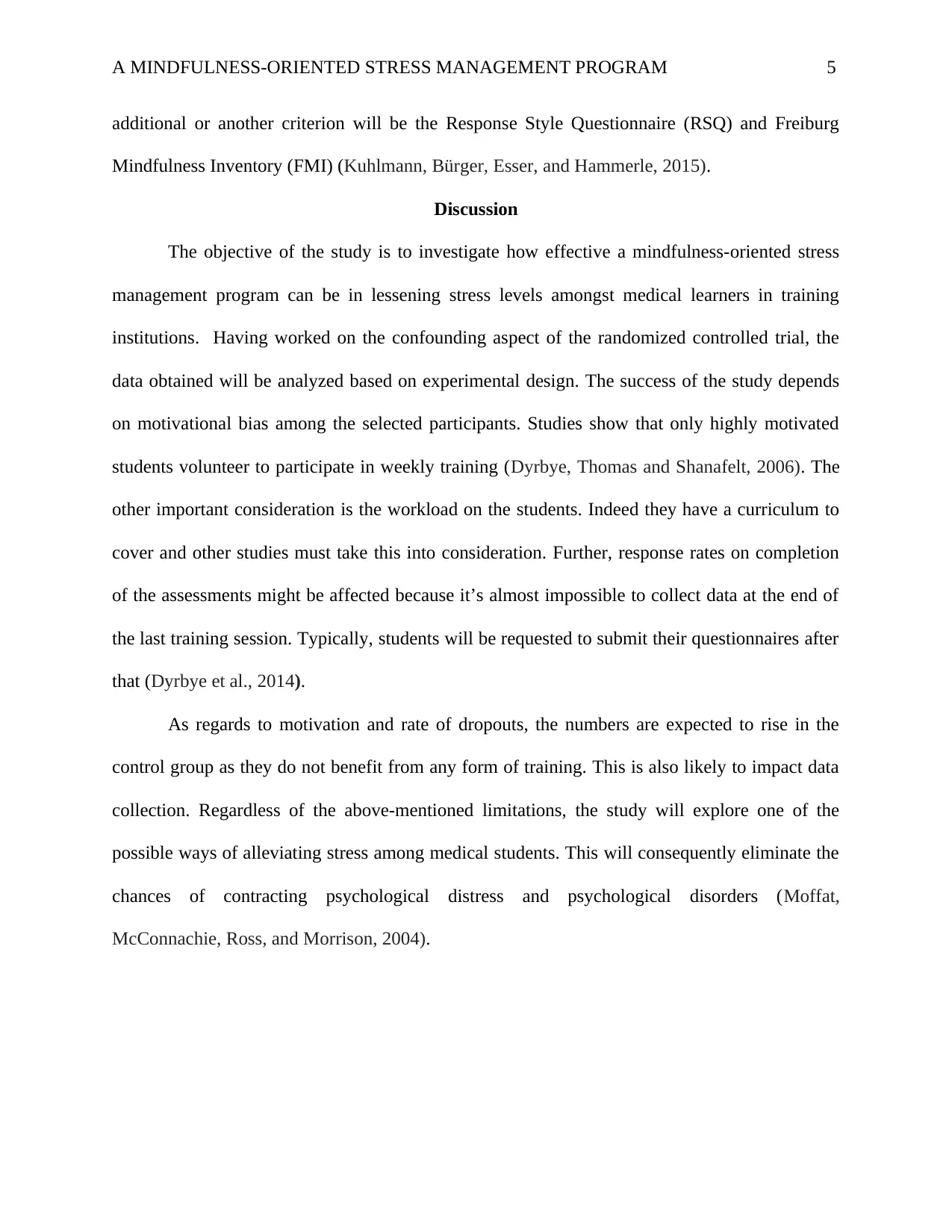
A MINDFULNESS-ORIENTED STRESS MANAGEMENT PROGRAM 5
additional or another criterion will be the Response Style Questionnaire (RSQ) and Freiburg
Mindfulness Inventory (FMI) (Kuhlmann, Bürger, Esser, and Hammerle, 2015).
Discussion
The objective of the study is to investigate how effective a mindfulness-oriented stress
management program can be in lessening stress levels amongst medical learners in training
institutions. Having worked on the confounding aspect of the randomized controlled trial, the
data obtained will be analyzed based on experimental design. The success of the study depends
on motivational bias among the selected participants. Studies show that only highly motivated
students volunteer to participate in weekly training (Dyrbye, Thomas and Shanafelt, 2006). The
other important consideration is the workload on the students. Indeed they have a curriculum to
cover and other studies must take this into consideration. Further, response rates on completion
of the assessments might be affected because it’s almost impossible to collect data at the end of
the last training session. Typically, students will be requested to submit their questionnaires after
that (Dyrbye et al., 2014).
As regards to motivation and rate of dropouts, the numbers are expected to rise in the
control group as they do not benefit from any form of training. This is also likely to impact data
collection. Regardless of the above-mentioned limitations, the study will explore one of the
possible ways of alleviating stress among medical students. This will consequently eliminate the
chances of contracting psychological distress and psychological disorders (Moffat,
McConnachie, Ross, and Morrison, 2004).
additional or another criterion will be the Response Style Questionnaire (RSQ) and Freiburg
Mindfulness Inventory (FMI) (Kuhlmann, Bürger, Esser, and Hammerle, 2015).
Discussion
The objective of the study is to investigate how effective a mindfulness-oriented stress
management program can be in lessening stress levels amongst medical learners in training
institutions. Having worked on the confounding aspect of the randomized controlled trial, the
data obtained will be analyzed based on experimental design. The success of the study depends
on motivational bias among the selected participants. Studies show that only highly motivated
students volunteer to participate in weekly training (Dyrbye, Thomas and Shanafelt, 2006). The
other important consideration is the workload on the students. Indeed they have a curriculum to
cover and other studies must take this into consideration. Further, response rates on completion
of the assessments might be affected because it’s almost impossible to collect data at the end of
the last training session. Typically, students will be requested to submit their questionnaires after
that (Dyrbye et al., 2014).
As regards to motivation and rate of dropouts, the numbers are expected to rise in the
control group as they do not benefit from any form of training. This is also likely to impact data
collection. Regardless of the above-mentioned limitations, the study will explore one of the
possible ways of alleviating stress among medical students. This will consequently eliminate the
chances of contracting psychological distress and psychological disorders (Moffat,
McConnachie, Ross, and Morrison, 2004).
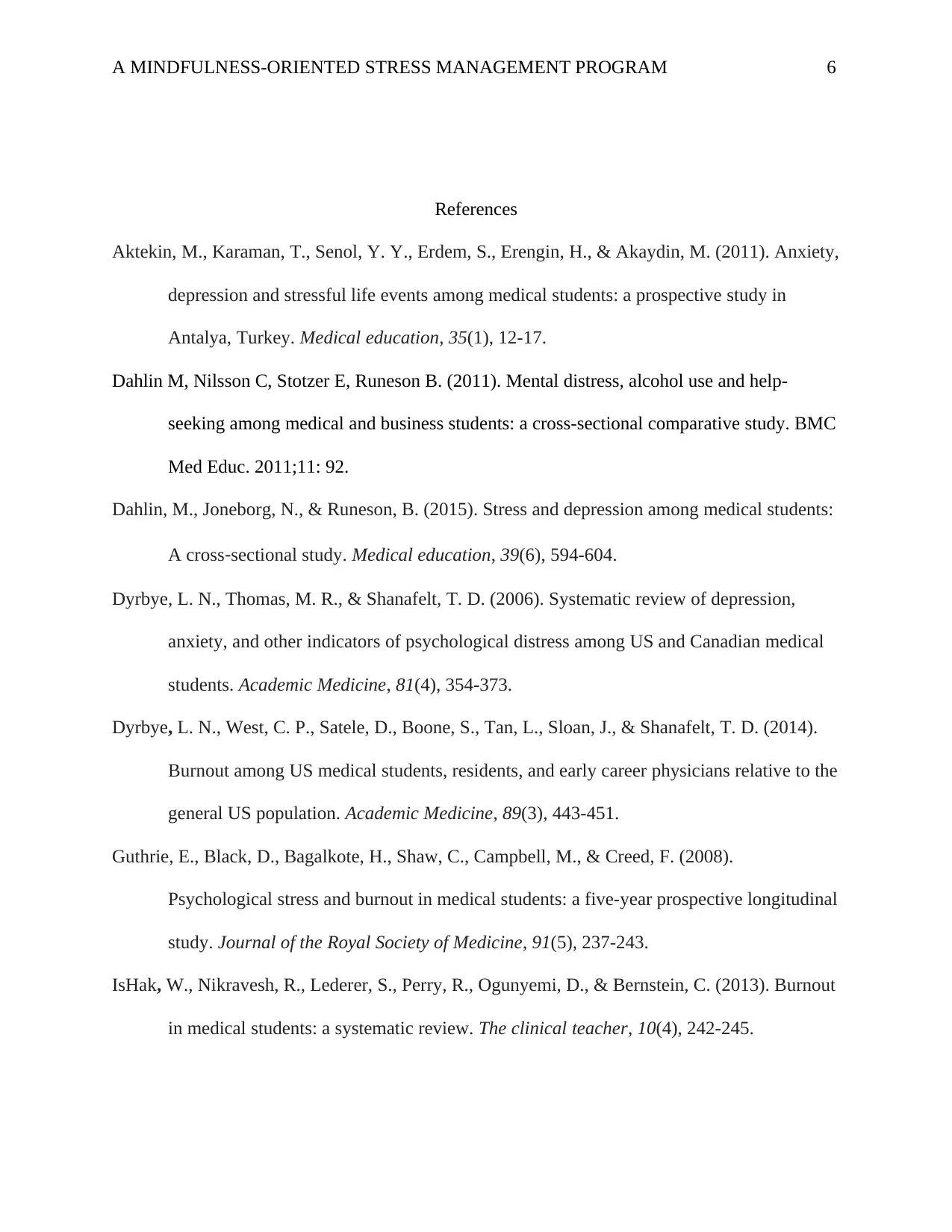
A MINDFULNESS-ORIENTED STRESS MANAGEMENT PROGRAM 6
References
Aktekin, M., Karaman, T., Senol, Y. Y., Erdem, S., Erengin, H., & Akaydin, M. (2011). Anxiety,
depression and stressful life events among medical students: a prospective study in
Antalya, Turkey. Medical education, 35(1), 12-17.
Dahlin M, Nilsson C, Stotzer E, Runeson B. (2011). Mental distress, alcohol use and help-
seeking among medical and business students: a cross-sectional comparative study. BMC
Med Educ. 2011;11: 92.
Dahlin, M., Joneborg, N., & Runeson, B. (2015). Stress and depression among medical students:
A cross‐sectional study. Medical education, 39(6), 594-604.
Dyrbye, L. N., Thomas, M. R., & Shanafelt, T. D. (2006). Systematic review of depression,
anxiety, and other indicators of psychological distress among US and Canadian medical
students. Academic Medicine, 81(4), 354-373.
Dyrbye, L. N., West, C. P., Satele, D., Boone, S., Tan, L., Sloan, J., & Shanafelt, T. D. (2014).
Burnout among US medical students, residents, and early career physicians relative to the
general US population. Academic Medicine, 89(3), 443-451.
Guthrie, E., Black, D., Bagalkote, H., Shaw, C., Campbell, M., & Creed, F. (2008).
Psychological stress and burnout in medical students: a five-year prospective longitudinal
study. Journal of the Royal Society of Medicine, 91(5), 237-243.
IsHak, W., Nikravesh, R., Lederer, S., Perry, R., Ogunyemi, D., & Bernstein, C. (2013). Burnout
in medical students: a systematic review. The clinical teacher, 10(4), 242-245.
References
Aktekin, M., Karaman, T., Senol, Y. Y., Erdem, S., Erengin, H., & Akaydin, M. (2011). Anxiety,
depression and stressful life events among medical students: a prospective study in
Antalya, Turkey. Medical education, 35(1), 12-17.
Dahlin M, Nilsson C, Stotzer E, Runeson B. (2011). Mental distress, alcohol use and help-
seeking among medical and business students: a cross-sectional comparative study. BMC
Med Educ. 2011;11: 92.
Dahlin, M., Joneborg, N., & Runeson, B. (2015). Stress and depression among medical students:
A cross‐sectional study. Medical education, 39(6), 594-604.
Dyrbye, L. N., Thomas, M. R., & Shanafelt, T. D. (2006). Systematic review of depression,
anxiety, and other indicators of psychological distress among US and Canadian medical
students. Academic Medicine, 81(4), 354-373.
Dyrbye, L. N., West, C. P., Satele, D., Boone, S., Tan, L., Sloan, J., & Shanafelt, T. D. (2014).
Burnout among US medical students, residents, and early career physicians relative to the
general US population. Academic Medicine, 89(3), 443-451.
Guthrie, E., Black, D., Bagalkote, H., Shaw, C., Campbell, M., & Creed, F. (2008).
Psychological stress and burnout in medical students: a five-year prospective longitudinal
study. Journal of the Royal Society of Medicine, 91(5), 237-243.
IsHak, W., Nikravesh, R., Lederer, S., Perry, R., Ogunyemi, D., & Bernstein, C. (2013). Burnout
in medical students: a systematic review. The clinical teacher, 10(4), 242-245.
⊘ This is a preview!⊘
Do you want full access?
Subscribe today to unlock all pages.

Trusted by 1+ million students worldwide
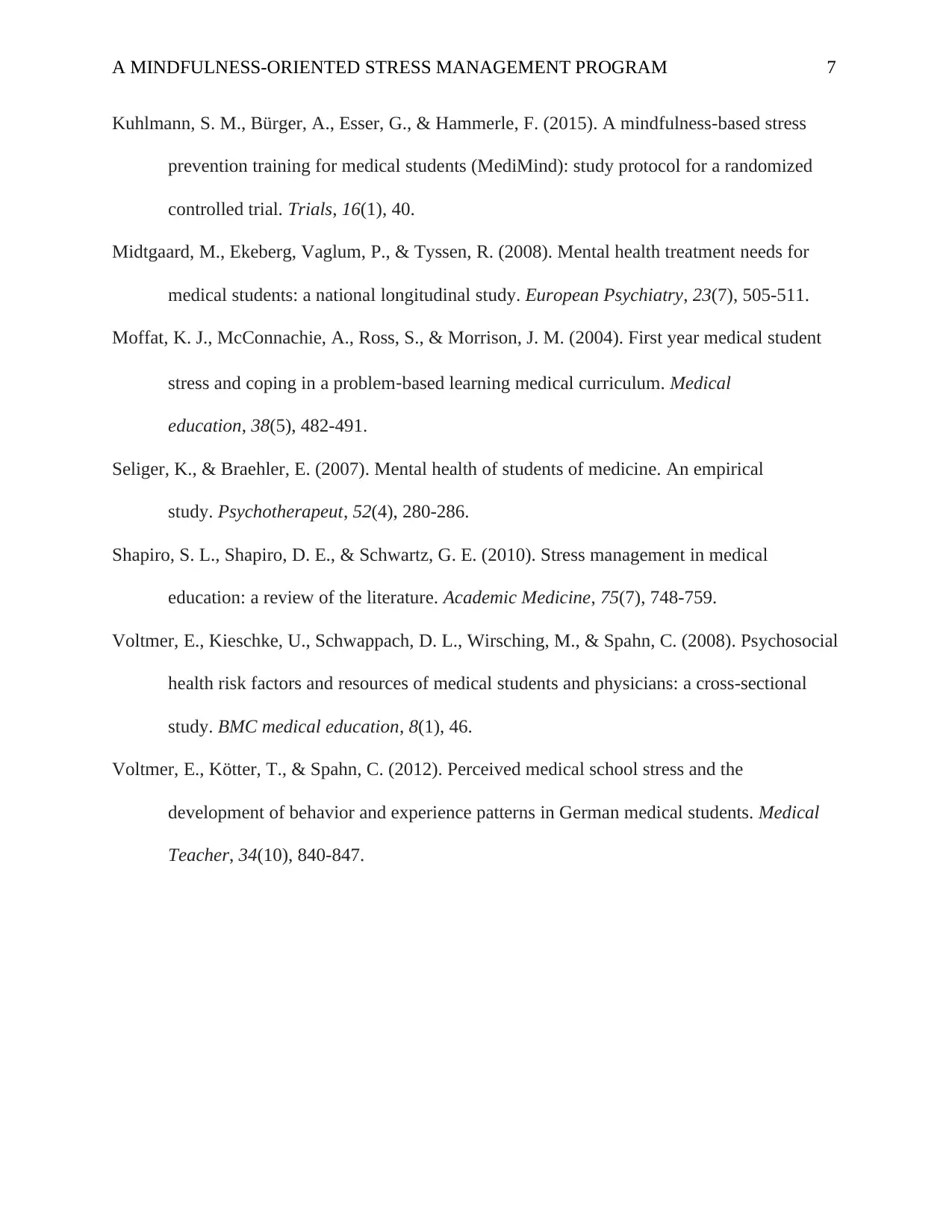
A MINDFULNESS-ORIENTED STRESS MANAGEMENT PROGRAM 7
Kuhlmann, S. M., Bürger, A., Esser, G., & Hammerle, F. (2015). A mindfulness-based stress
prevention training for medical students (MediMind): study protocol for a randomized
controlled trial. Trials, 16(1), 40.
Midtgaard, M., Ekeberg, Vaglum, P., & Tyssen, R. (2008). Mental health treatment needs for
medical students: a national longitudinal study. European Psychiatry, 23(7), 505-511.
Moffat, K. J., McConnachie, A., Ross, S., & Morrison, J. M. (2004). First year medical student
stress and coping in a problem‐based learning medical curriculum. Medical
education, 38(5), 482-491.
Seliger, K., & Braehler, E. (2007). Mental health of students of medicine. An empirical
study. Psychotherapeut, 52(4), 280-286.
Shapiro, S. L., Shapiro, D. E., & Schwartz, G. E. (2010). Stress management in medical
education: a review of the literature. Academic Medicine, 75(7), 748-759.
Voltmer, E., Kieschke, U., Schwappach, D. L., Wirsching, M., & Spahn, C. (2008). Psychosocial
health risk factors and resources of medical students and physicians: a cross-sectional
study. BMC medical education, 8(1), 46.
Voltmer, E., Kötter, T., & Spahn, C. (2012). Perceived medical school stress and the
development of behavior and experience patterns in German medical students. Medical
Teacher, 34(10), 840-847.
Kuhlmann, S. M., Bürger, A., Esser, G., & Hammerle, F. (2015). A mindfulness-based stress
prevention training for medical students (MediMind): study protocol for a randomized
controlled trial. Trials, 16(1), 40.
Midtgaard, M., Ekeberg, Vaglum, P., & Tyssen, R. (2008). Mental health treatment needs for
medical students: a national longitudinal study. European Psychiatry, 23(7), 505-511.
Moffat, K. J., McConnachie, A., Ross, S., & Morrison, J. M. (2004). First year medical student
stress and coping in a problem‐based learning medical curriculum. Medical
education, 38(5), 482-491.
Seliger, K., & Braehler, E. (2007). Mental health of students of medicine. An empirical
study. Psychotherapeut, 52(4), 280-286.
Shapiro, S. L., Shapiro, D. E., & Schwartz, G. E. (2010). Stress management in medical
education: a review of the literature. Academic Medicine, 75(7), 748-759.
Voltmer, E., Kieschke, U., Schwappach, D. L., Wirsching, M., & Spahn, C. (2008). Psychosocial
health risk factors and resources of medical students and physicians: a cross-sectional
study. BMC medical education, 8(1), 46.
Voltmer, E., Kötter, T., & Spahn, C. (2012). Perceived medical school stress and the
development of behavior and experience patterns in German medical students. Medical
Teacher, 34(10), 840-847.
1 out of 7
Related Documents
Your All-in-One AI-Powered Toolkit for Academic Success.
+13062052269
info@desklib.com
Available 24*7 on WhatsApp / Email
![[object Object]](/_next/static/media/star-bottom.7253800d.svg)
Unlock your academic potential
Copyright © 2020–2025 A2Z Services. All Rights Reserved. Developed and managed by ZUCOL.





